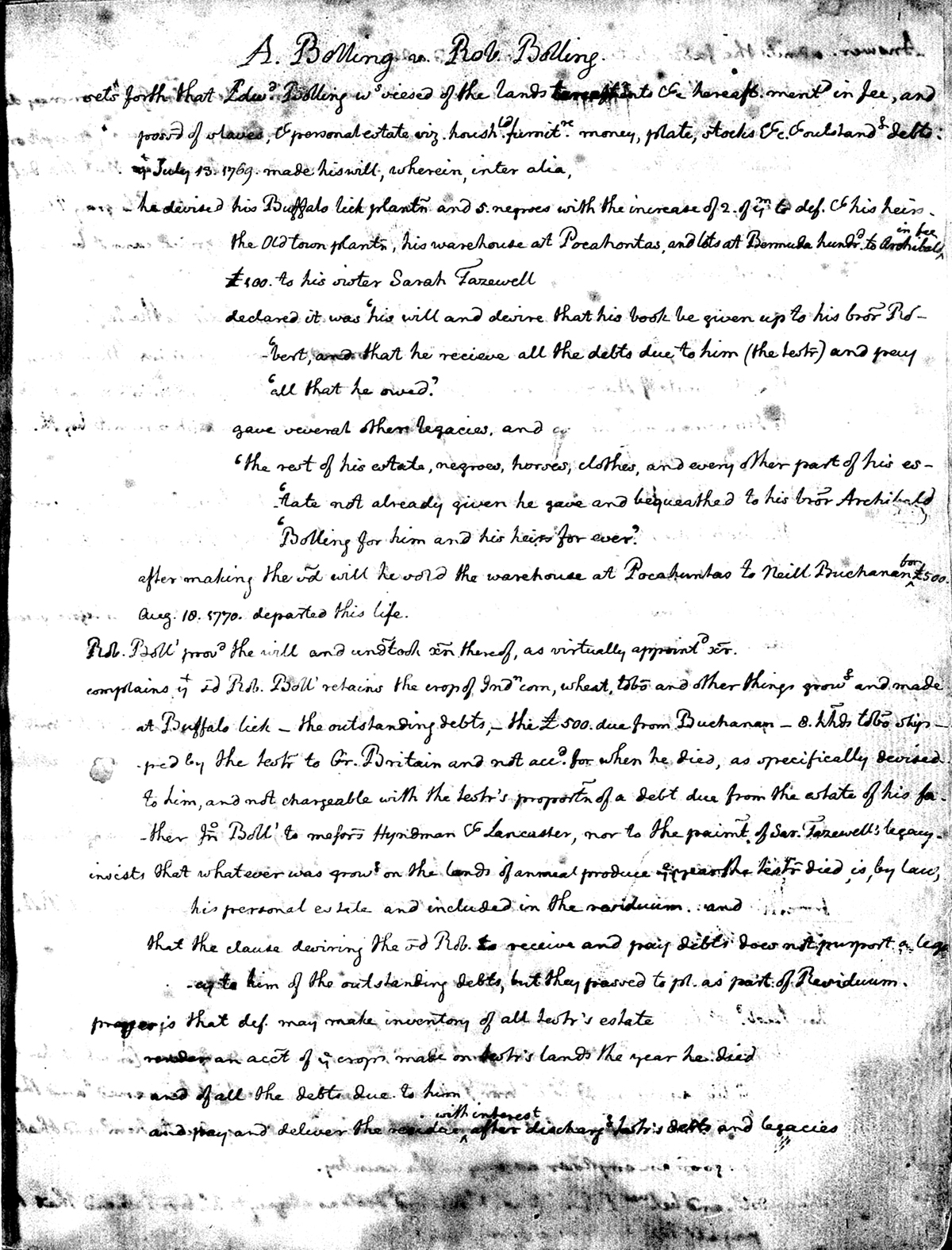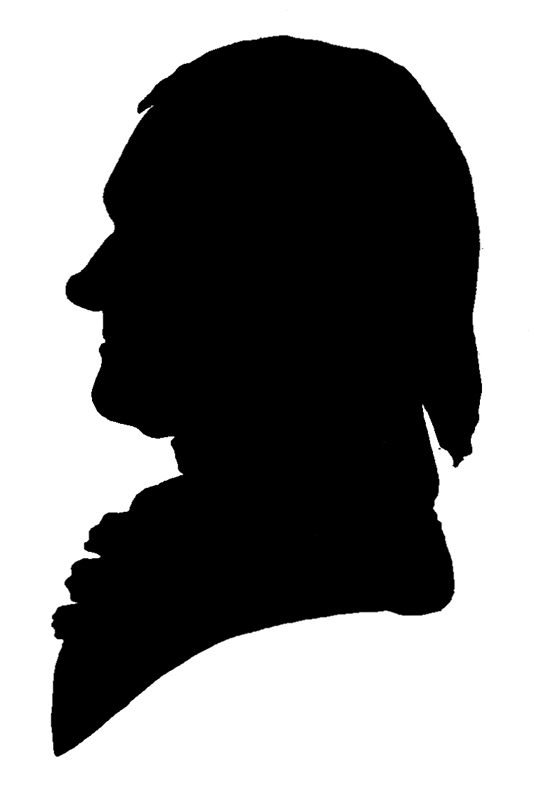Bolling v. Bolling
Silhouette of George Wythe by William Bache, from Shades of Our Ancestors, by Alice Van Leer Carrick (Boston: Little, Brown and Company, 1928). Bache silhouette of Thomas Jefferson, from Carrick's Shades of Our Ancestors.
Bolling v. Bolling (1770-1771) centered on a familial disagreement over inheritance that was referred from the Virginia General Court to arbitration before Benjamin Waller. The dispute involved the will of Edward Bolling and was brought by his brother Archibald Bolling against another brother, Robert Bolling, who had probated the will and acted as executor. The notes incorporating the arguments in this case are important for their revealing insight into the state of early American law, as viewed and used by attorneys at the time, and because the plaintiff and defendant were represented, respectively, by George Wythe and his former student Thomas Jefferson.
Contents
Jefferson's notes
Thomas Jefferson's Case Book contains an entry dated December 2, 1770, that indicates the parties involved in the Bolling litigation, the procedural posture of the case, and the costs charged and received. The full text of the entry is: "Archbld. Bolling v. Robt. Bolling (Buckingham). Case in Canc. Referred to arbitration. Desired by R. Bolling to state it with arguments at length in writing. Charge £5.—1771 Sep. 13. Recd. £9-17."
Not many materials from 18th century American legal cases survive.
Factual background
At the center of the litigation between brothers Archibald and Robert Bolling is the will of their brother, Edward Bolling. These brothers were members of an important Virginia family headed by their father, John Bolling, Jr. (1700-1757), whose home was Cobbs plantation, located in Chesterfield County on the north shore of the Appomattox River outside of Petersburg. The Bollings descended from the son of John Rolfe and Pocahontas, Thomas Rolfe.
John Bolling, Jr., and Elizabeth Bland Blair (niece of James Blair, the first president of the College of William and Mary) married on August 1, 1728, and had seven children. The second of their offspring, John Bolling, III (1737-1800), married Thomas Jefferson’s sister, Martha. The testator, Edward Bolling, was born in 1746 and died in 1770, at which point his will was subject to the controversy between his brothers, Robert Bolling (1738-1775), of Chellowe plantation, and Archibald (1750-1827).
Edward Bolling's will
- Main article: Edward Bolling's Will
Edward Bolling made his will on July 13, 1769. To his older brother Robert he left his Buffalo Lick plantation and several enslaved people. Archibald was to receive other lands and was designated the residuary devisee and legatee under the will.
Issues

The arguments made by Wythe for the plaintiff and Jefferson for the defendant revolve around two separate issues before the arbitrator.
First, the parties disputed whether the defendant, Robert Bolling, was entitled to the crops growing on Buffalo Lick plantation, which had been devised to him by Edward, at the time of Edward's death. Wythe argued instead that the crops should pass to the plaintiff, Archibald Bolling, as the residuary legatee to the will, as part of Edward's personal estate. Thus, the issue is whether the crops were part of the land or separable personal property.
Second, the parties disagreed as to whether Edward's gift of his "book" to the defendant, Robert, was a legacy to him, as executor, of the surplus of the amounts credited to Edward after Edward's debts at his death had been paid. In the alternative, Wythe urged that the surplus was an undisposed part of Edward's personal property that should pass under the will's residual clause to the plaintiff, Archibald.
Case
Archibald brought this case as a Chancery suit in the Virginia General Court, from which it was referred to arbitration because of its complex issues. The General Court was composed of members of the Governor's Council and were, according to Jefferson, "chosen from among the gentlemen of the country, for their wealth and standing, without any regard to legal knowledge." [1] In arbitration, the the case would be heard by an actual lawyer capable of appreciating and interpreting the complications of common law inheritance and property law.
Arbitration
Jefferson's Case Book reported that a case was referred to Benjamin Waller, acting as arbitrator. [2] Waller was the clerk of the General Court and would later become a judge himself.
Wythe's first argument for plaintiff
Wythe first argued that the plaintiff, Archibald Bolling, was entitled to the crops growing on the Buffalo Lick plantation, land that had been expressly given to the defendant, Robert Bolling, in Edward Bolling's will. The basis for this position was that the crops, known under the law as "emblements," were personal chattel (also known as personal property, as opposed to real property) and thus moveable, or able to be separated from the land. Because the emblements were not fixed to the land, Wythe reasoned they should not have passed with the land to Robert but rather to Archibald as the residuary legatee under the will. Wythe posited that the growing crops were like any other personal chattel, such as cattle, furniture, or harvested plants, and should have followed the representative of the sower, which in this case was Archibald.
Wythe next employed an odd tactic. Anticipating the authorities Jefferson would cite for the opposing view, that emblements should pass with the land, Wythe attempted to discredit reporters of case law who supported this contrary position. In the face of Wentworth's reporting a case in which emblements passed with the land, Wythe called him "a compiler only, and what he said of the sale or conveiance[,] since he quotes no authority[,] is but his opinion."[3] A case reported by Sir Humphrey Winch became "another unauthoritative publication," as it was translated from Winch's original French.[4] In addition, Winch's report contained a eulogy for Winch himself, a fact that caused Wythe to cast doubt over whether Winch himself actually compiled the reports or whether some anonymous, unauthorized meddler was at work.
Wythe's final reason for asserting that the emblements should pass to Archibald involved a Virginia statute providing that if a landowner died before March 1 with that year's crop having been planted, the slaves working on the crop would continue working until December 25, when the crops would be deemed assets in the hands of the executor and the slaves would be given over to the legatee. Wythe interpreted the statute as treating slave labor and the emblements similarly, as both were chattel and thus should have passed to Archibald. Wythe asserted it would be illogical for the law to allow Robert to reap the benefit of both the slaves' labor in tending the crops and the benefit of being able to own the crops once they had been harvested. Under this scenario, Archibald would receive neither the benefit of the slaves' labor for the year nor the harvested crops.
On the second issue, Wythe examined the text of the will to determine that the surplus left over after Edward's debts had been satisfied was part of Edward's personal property and thus should have passed to the plaintiff, Archibald. Wythe urged that the language of the will -- "it is my will and desire that my book be given up to my bro[the]r Robert, and that he recieve [sic] all the debts due to me, and pay all that I owe" -- does no more than appoint Robert as the executor of the estate, tasked with collecting Edward's credits and paying off his debts. Wythe concluded his first argument by declaring that the surplus left over after Edward's accounts had been balanced should have passed to Archibald, along with the emblements.
Jefferson's first argument for defendant
In presenting his initial argument in favor of Robert Bolling, Jefferson began simply with the Latin maxim "quicquid solo, solo cedit" ("whatever is planted in the soil belongs to the soil"). Jefferson then asserted that, contrary to Wythe's statements and reasoning, the vast body of English case law supported the conclusion that crops growing on the land should pass with the land to the defendant Robert. Using a mass of diverse authorities, Jefferson argued that emblements were not solely personal property, or chattel, as Wythe asserted, but rather were of a mixed nature, in part personal and in part real. Jefferson wryly noted that he and Wythe both agreed that the emblements should generally follow the sower or his representative, who would here be Archibald, with one important difference: Wythe claimed that Edward's estate had not determined by his own act, but Jefferson pointed out that Edward's conveyance by will did indeed determine his estate. Furthermore, Jefferson argued that in the absence of any indication from the testator, Edward, that the emblements should belong to Archibald, the emblements should have passed naturally to Robert with the land.
Jefferson next addressed Wythe's assertions that his authorities were unfounded by pointing out that if an authority had been cited by the judges at Westminster, then the reporter was probably authoritative. Additionally, Jefferson demonstrated that some of the greatest legal jurists' works, such as Coke and Plowden, were published in French and later translated for the English-speaking world. The thoroughness of Jefferson's reading of the law impressed Wythe to proclaim summarily, in spite his own opening arguments, at the start of his second argument that "the common law supposed the owner of the soil to have a right to emblements."
Jefferson next addressed Wythe's use of the statute involving slave labor and the harvesting of crops. Jefferson asserted that the statute did not affect property rights at all but rather ensured that a planted crop would be harvested for the benefit of the community. According to Jefferson, in the event that crops needed to be harvested, reapers could not be hired as easily as they could have been in England, since the work here was done by slave labor alone. Therefore, the legislature provided that the slaves who previously had worked the land would remain and harvest the crops, regardless of whom the slaves belonged to, in order to save the emblements for the good of the community. The labor for harvesting the crops, Jefferson concluded, was simply legislatively prescribed as being for the benefit of whoever owned the emblements, regardless of whether that person also owned the slaves.
Jefferson disputed Wythe’s assertion that the language of the will giving Edward’s book to Robert and directing Robert to pay Edward’s debts served to create the executorship and nothing more; instead, Jefferson argued that the language constituted a gift of the book to Robert, directing him to pay Edward’s debts but allowing him to retain the surplus without having it pass to the residuary legatee, Archibald. Jefferson claimed that Edward intended beneficial effect for Robert and stated that he would prove this intention, both by the words of the will and by parol evidence outside the will.
On the face of the will, Jefferson argued that the word “give” -- as in, “it is my will and devise that my book be given up to my brother Robert” -- implied not just a transfer of the physical object of the book but also its use. Under Jefferson’s interpretation, a gift of the book alone would have been empty and meaningless if Edward had not also intended to give to Robert the use of the credits contained therein.
Finally, Jefferson introduced parol evidence from Edward’s overseer and wife to the effect that Edward wanted the surplus from his credits to remain with Robert. In Jefferson’s own words, “this part of the testimony I take to be conclusive. for who can best judge of the test[ato]r’s intention: we who see nothing but the written letter? or those who saw him write it; to whom he repeated and explained the substance of what he wrote; and with whom he often conversed on the subject?”
Transcript of Wankford v. Wankford
The Bolling manuscript next contains a transcript of the 1703 English case Wankford v. Wankford, which Jefferson had relied on for an alternative explanation as to why the gift of Edward's book to Robert was also a gift to Robert of the book's credits. Jefferson noted that the case was too long to be transcribed but that a reader could later turn to it and see that it was dispositive on Jefferson's point. The transcription is in the script of Jefferson's friend, Anderson Bryant.
Wythe's second argument for plaintiff
The second round of arguments made in the case largely echoed the first, refining certain points for the arbitrator's benefit. Wythe begins his second argument by complimenting Jefferson's use of the common law, admitting that Jefferson accurately stated the common law position on emblements. Wythe countered, however, that that interpretation should not have been controlling, as the Virginia statute on slave labor had altered the common law. Thus, as he argued earlier, the crops should not have gone with the land to Robert but instead to Archibald, the residuary legatee, as personal property.
Wythe also disputed Jefferson's definition of "assets," claiming that the crops should have been considered assets as part of the estate and thus given to Archibald. Again, Wythe claimed that Edward's book did not give all the debts to Robert but instead were part of the residuum, due to the Plaintiff. Wythe's second argument largely recapitulated his first argument, emphasizing that the crops and the surplus debt should have belonged to Archibald.
Jefferson's second argument for defendant
Jefferson began his second argument by disputing Wythe's contention that the statute altered the common law rule of emblements, which, if applied, would mean that Robert should have been entitled to the crops growing on Edward's land at the time of his death. Jefferson directed the arbitrator's attention to the text of the statute, claiming that "you will not find a syllable expressing that the emblements are to be taken from the devisee; nor yet that they are to be given to any other person." Jefferson states that Wythe's interpretation strays from "nature and reason," contorting the law so that it fit Wythe's assertion that the crops are annexed to the labor required to harvest them and thus belonging to Archibald.
Jefferson claimed that just because Edward did not specify that the emblements were to be given to Robert Bolling along with the Buffalo-Lick plantation, the law should not be interpreted to mean that the emblements are not part of the plantation. In fact, Jefferson asserted, the common law very clearly includes the emblements as part of the real property; to add language including the emblements would have been "surplusage." The remainder of Jefferson's second argument was devoted to rebutting Wythe's arguments about the meaning of the "book," with Jefferson inserting barbed responses to Wythe's arguments and criticisms.
Wythe's reply for plaintiff
Wythe responded to his mentee's arguments with a lengthy final reply occupying sixty-two manuscript pages. As with the second arguments, Wythe largely repeated his earlier assertions, this time punctuating his reply with critiques of trivial details of Jefferson's arguments.
See also
References
- ↑ Jefferson's Reports, 5.
- ↑ Jefferson Case Book, no. 233
- ↑ George Wythe, "First Argument for Plaintiff," reprinted in Bernard Schwartz, Barbara Wilcie Kern, R. B. Bernstein, eds., Thomas Jefferson and Bolling v. Bolling: Law and the Legal Profession in Pres-Revolutionary America (San Marino, CA: The Huntington Library; New York: New York University School of Law, 1997), 155.
- ↑ Ibid., 154.
External links
- "Robert Bolling," Encyclopedia Virginia.

